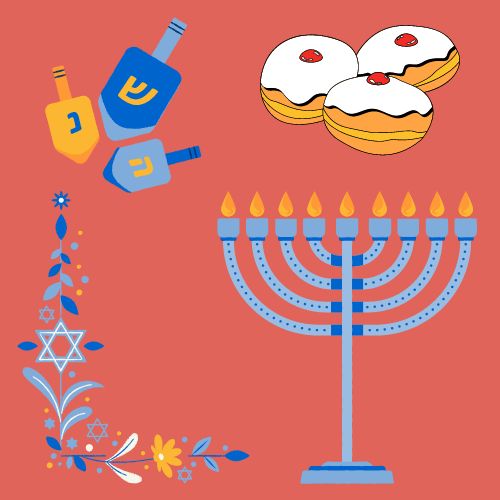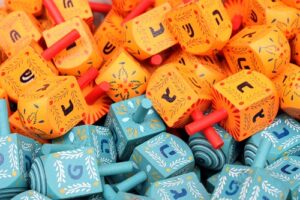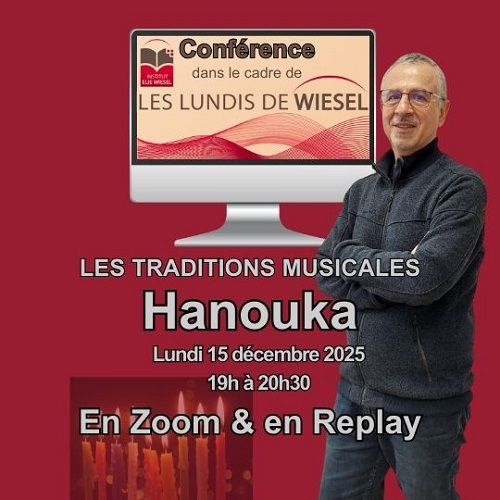
Chanukah – חנוכה is the Jewish feast that commemorates the re-inauguration of the Second Temple in Jerusalem in the 2nd century BC, following the victory of the Maccabees over the soldiers of the Seleucid king Antiochus Epiphanes IV.
According to the rabbinic tradition, during this consecration, the miracle of the vial of oil occurred, allowing the Temple priests to burn for eight days a quantity of oil normally barely sufficient for only one day. This is why Chanukah is also called the “Festival of Lights” and lasts for eight days, from 25 Kislev to 2 or 3 Tevet (between the end of November and the end of December in the Gregorian calendar).

The candle lighting ceremony
Several songs are specific to the candle lighting ceremony, such as:
Hadlakat Hanerot – Blessing preceding the lighting of the candles
Hanerot hallalou, which relates the origin of the Chanukah lights and their sacredness.
Hanerot Halalu – Coral Ensemble
Hanukat habayit (Ps. 30) which evokes the inauguration of the Temple
Psalm 30 – Albert Bouhadana (Excerpt)
Maoz tsour, which reminds us of the many times God has saved his people.
Maoz tsour – Marcel Papier
In addition, there are many songs in Yiddish, Judeo-Spanish, Hebrew, etc., usually performed to lively rhythms, such as Dreidel, Dreidel, Dreidel; Oy Hanikke; El festin de Hanuka; Ochos kandelicas; Sevivon, sov sov sov… or even Hasidic melodies.
The Dreidel Song – in Yiddish – Dylan Seders Hoffman, Dani Apple and Lorin Zackular
Oy Chanukah – The Klezmer Conservatory Band
Ocho Kandelikas – Flory Jagoda
Sevivon Sov Sov Sov
Yemei Hanouka
Yevanim nikbezu – Tiferet Yisrael Yeshiva (Excerpt)
The specific liturgy of Chanukah
In the morning, the austere reading of the Tahanun (“supplication”) is replaced by the Hallel (“praise”) because of the miracle that took place (mishum nissa) in the land of Israel. It is recited in its entirety (from Psalm 113 to Psalm 118) during the eight days of the festival of Chanukah, after the morning Amida.
A special Torah section (Zot Hanukah’ Hamizbeah’) is also read in the synagogue each morning.
The Torah reading for the First Day of Chanukah – Rabbi Cantor Yehuda Abittan (Excerpt)
The blessing Al hanissim is inserted within the Amidah during the morning, afternoon and evening services and during the Birkat hamazon (blessing of grace after meals). It takes its name from its opening words, “Al hanissim” (“[We thank You] for the miracles”) and is followed by a brief account of the victory of Mattathias and his sons.
Al hanissim – Hans Bloemendal
There are also religious poems specific to each tradition, such as the Alsatian piyyut Schnei zessim [zetim] noted in 1864 by Samuel Naumbourg [1]Samuel Naumbourg, Shirei kodesh, Nouveau recueil de chants religieux à l’usage du culte israélite, Paris, rue Vendôme, 1864.
Schnei zetim – Adolphe Attia (Excerpt)
- Browse other content on Chanukah
- Listen to the playlist Chanouka 1
- Listen to the playlist Chanouka 2

| 1 | Samuel Naumbourg, Shirei kodesh, Nouveau recueil de chants religieux à l’usage du culte israélite, Paris, rue Vendôme, 1864 |
|---|



